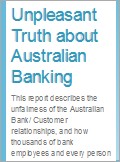The Martin Committee stated best practice should not be the sole prerogative of banks. The Campbell Committee’s inquiry into the Australian financial system, on the other hand, endorsed the need for increased competition. Campbell’s recommendations were set out in its Final Report, published in September 1981.
This was the first major change in terms of regulation. Following the Campbell Committee’s 1979 Australian Financial System Inquiry, the role of the financial sector was said to have changed forever.
This Campbell Committee’s report is significant as it made a strong argument for various forms of self-regulation. It’s report threshed out the advantages of a protective scheme of co-regulation, which was self-regulation but with limited government involvement to the extent necessary to ensure the desired prudential objectives are achieved effectively and equitably.
The Committee’s members were highly esteemed banking and government officials. They were given the task of exploring the existing regulatory regimes and making recommendations to encourage greater competition in the banking sector.
The Campbell Committee’s members (September 1981), were:
J. K. Campbell
A.W. Coates
K.W. Halkerston
R.G. McCrossin
J.S. Mallyon
F. Argy
When the Committee’s report was published, Malcolm Fraser was Prime Minister and John Howard, Treasurer.
The Committee’s recommendations led to the government supporting deregulation, $A being floated, exchange controls removed and foreign banks allowed entry into Australian markets. Matters addressed, included:
Definitions and Background
The Campbell Committee explored different regulatory regimes with varying levels of government involvement. Extreme regulation meant a high level of ‘formal regulation and supervision’ by government. At the other extreme, deregulation meant the absence or a low level of government involvement with little or no regulation and supervision.
Full self-regulation meant leaving bankers police their own ranks whilst, in between, hybrid of co-regulation took on the features of both government regulation and self-regulation.
Purpose of Deregulation
In its report the Campbell Committee proceeded on the premise ‘the most efficient way to organise economic activity is through a competitive market system, which is subject to minimum regulation and government intervention.’
In the spirit of deregulation, the Committee went as far as making a case for removal of the then existing prohibition on entry of foreign banks into Australia. It did so on the firm belief ‘adequate and vigorous competition was an essential requirement for efficient operation of financial markets.’
Self-Regulate, Co-Regulate, Public Confidence
The Campbell Committee received submissions stressing adverse impact of regulation for efficient financial intermediation. On the other hand, the Rae Report of 1974 outlined the need for regulators to have regard for efficiency as well as investor protection.
The Rae Report raised concerns excessive attention to investor protection might impose costs on companies, discouraging recourse by them to the market. The restriction of options available to investors might then impair market efficiency.
Need for Efficiency v’s Cost Considerations
According to the Campbell Committee, in developing and revising customer protection, it was important government’s recognise the efficiency and cost considerations. The Committee acknowledged benefits of greater flexibility that came with self-regulation, but was conscious of possible conflicts between the interests of self-regulated banks and the community in general.
Campbell thought potential conflicts of interest could be avoided, in part, by broadening the membership of the self-regulating body to include representatives of affected groups. The Committee identified the shortcomings of self-regulation and took into account Rae Repor’s findings in 1974 and the Wilson Committee’s in the United Kingdom.
Shortcomings of Self-Regulation
There were certain shortcomings encouraging competition whilst supporting self-regulation. They were:
-
- lack of investigatory powers, appropriate sanctions or authority to enforce rules meant the success of self-regulation depended heavily on voluntary acceptance of the power of the self-regulating authority; and
- possibility of self-serving, anti-competitive regulation or non-enforcement rules; and
- activities and organisations tend to develop outside the jurisdictional power of the self-regulatory body; and
- increasing complex financial markets may be less amenable to informal, non-statutory methods of regulation, particularly by part-time committees.
Due to the Rae Report’s views and shortcomings of self-regulation, the Campbell Committee expressed a preference for co-regulation, with more direct government participation in the regulatory process.
The shift in direction by the government was demonstrated by the enactment of the Securities Industry Act as well as increased regulation of takeovers, and other market practices.
Senate Committee Report webpage (Sub No. 90): Click Here…
